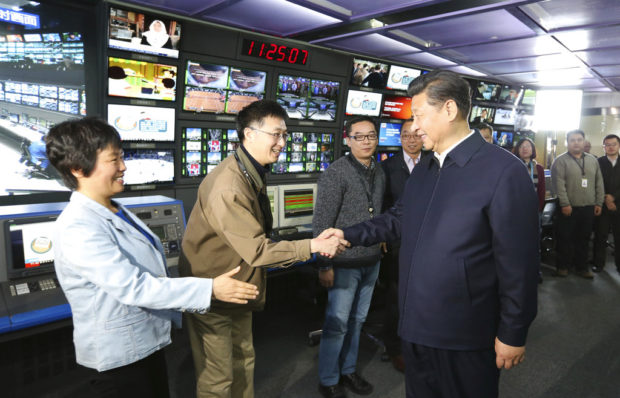China reaches out to US over demand for media registration

In this Feb. 19, 2016 file photo released by China’s Xinhua News Agency, Chinese President Xi Jinping (right) shakes hands with staff members at the control room of China Central Television (CCTV) in Beijing. AP
BEIJING — China has reached out to the US over reports that the Department of Justice has ordered two top Chinese state-run news outlets to register as foreign agents, a spokesman said Wednesday, adding that Beijing opposed “politicizing” the role of the media.
Foreign Ministry spokesman Geng Shuang said that Beijing had “contacted and communicated” with the US side over the issue, but gave no details.
“Media serve as an important bridge and link to help the people from different countries to better understand and communicate with each other,” Geng told reporters at a daily briefing. “We should provide convenience for media’s normal works instead of posing obstacles, still less politicizing their role.”
The Wall Street Journal said Tuesday that the Xinhua News Agency and CGTN, the international arm of state broadcaster CCTV, had been told in recent weeks to register as foreign agents amid growing scrutiny of efforts by overseas media organizations to influence US public opinion. The demand was also reported by Bloomberg News.
Registering with the Foreign Agents Registration Act, or FARA, would put Xinhua and CGTN in the same legal category as lobbyists working for overseas entities and could cause them to lose their congressional press credentials, as happened to the US affiliate of Russia’s state-run RT television network, the Journal reported.
Article continues after this advertisementThe US broadcaster for Russia’s government-controlled Sputnik Radio also registered under FARA. Both Russian outlets had been accused by US intelligence of being part of a Moscow-led effort to interfere in the 2016 presidential election.
Article continues after this advertisementFollowing that, in January a letter from a bipartisan group of senators including Marco Rubio and Patrick Leahy called on the Justice Department to provide information on state-run Chinese media operating in the US, including Xinhua, which is directly under the control of the State Council, China’s Cabinet, and exists to produce news reports, distribute propaganda and collect intelligence.
The letter cited a report from the National Endowment for Democracy, saying both China and Russia exploit a “glaring asymmetry” by raising “barriers to external political and cultural influence at home while simultaneously taking advantage of the openness of democratic systems abroad.”
“A sensible step for the United States government to take is appropriately enforcing existing laws, such as FARA, designed to protect against just such concerns,” the letter said.
Chinese media is almost entirely state-run and heavily censored, while the country maintains strict limits on the presence and ability of foreign outlets to report and travel in the country.
Another state outlet, China Daily, has registered under FARA through its US distribution company. The newspaper has been aggressively seeking to boost its presence in the US through newsstand sales and inserts in the Washington Post and other American newspapers. CGTN and other Chinese news organizations have also been rapidly expanding their foreign presences.
Spokesmen for Xinhua and CGTN could not immediately be contacted for comment.